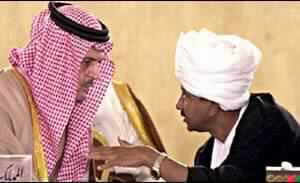BEIRUT, JERUSALEM, WASHINGTON
Arab foreign ministers are discussing a Saudi peace plan for the Middle East amid stern warnings of what may happen if there is no settlement with Israel.
The ministers are planning the agenda for the Arab League summit that starts in Beirut on Wednesday.
The delegates have been discussing a Saudi plan offering Israel a return to peace if it leaves all Arab land occupied in the 1967 Middle East war and agrees to a "just solution" for Palestinian refugees.
They are demanding the attendance of Yasser Arafat, but Israeli Prime Minister Ariel Sharon has yet to decide if he will permit the Palestinian leader to leave his Ramallah headquarters, or if he will be allowed to return from Beirut after the summit.
Much depends on whether any progress is made at talks scheduled for Monday between Israeli and Palestinian security chiefs on a new compromise proposal suggested by the US special envoy, General Anthony Zinni.
The Arab League's Secretary-General Amr Moussa opened the preparatory meeting in Beirut on Monday by reminding all present that both the regional and the international situation were "critical".
"We have a choice: either justice, peace and progress or chaos and escalating confrontation whose consequences nobody can predict," he said.
Arab Proposals
A draft text of the plan to be presented for approval by the heads of state calls for Israel and its citizens to accept the peace proposal to enable Arab states and Israel to co-exist peacefully.
Specifically, the Council of the Arab League would want Israel to:
· Withdraw from all Palestinian lands, the Golan Heights and the remaining occupied areas of south Lebanon to return to its 4 June, 1967 borders;
· Accept an independent Palestinian state in the West Bank and Gaza with Jerusalem as its capital;
· Agree to find an acceptable solution for Palestinian refugees.
In return, the Arab states would:
· Consider the Arab-Israeli conflict over and agree a peace treaty;
· Achieve peace across the region;
· Establish normal relations with Israel.
Arafat's Presence
Arafat's presence at the summit in Beirut could add momentum and weight to an internationally backed Saudi land-for-peace peace initiative that Arab leaders are expected to endorse at their two-day meeting starting Wednesday.
Israeli Prime Minister Ariel Sharon was due to convene key ministers Monday evening to consider lifting a travel ban on Arafat. And truce talks that made no progress Sunday were expected to resume when the sides had considered new U.S. ideas.
If Arafat is allowed to go, Israel could decide to stop him returning if it deems any message he delivers at the summit an "incitement" to violence.
At his headquarters in Ramallah, Arafat has been meeting the European Union's Middle East envoy Miguel Moratinos to discuss the latest developments towards a possible cease-fire. The EU, like the US, is urging Israel to allow Arafat back into Lebanon, in what would be seen as a symbolic step towards a truce since Arafat and his guerrillas were ousted from Beirut in the early eighties.
But while diplomatic efforts continue, violence rages on, with the latest Israeli incursion into Palestinian territory this morning killing at least one Palestinian.
White House Prods Israel on Arafat Trip to Summit
White House spokesman Ari Fleischer said President Bush believed it was time for Arab nations "to seize the moment" and support a Saudi-inspired land-for-peace deal with Israel that will be debated at the Beirut meeting.
"The president believes that Prime Minister Sharon and the Israeli government should give serious consideration to allowing Yasser Arafat to attend the meeting in Beirut," Fleischer said.
Quiet Optimism
Lebanon's Foreign Minister Mahmud Hammud said: "We want peace not surrender.
"We will not accept anything less than regaining our firm rights."
There has been quiet and cautious optimism about the Saudi plan from the international community, including Israel.
But the US and Israel are demanding a ceasefire before moving forward - in the US case for Vice President Dick Cheney to meet Mr Arafat, and on Israel's part to allow him to travel to Beirut.
Violence Continued
Violence raged on despite the truce talks. Israeli tanks and armored bulldozers entered the Palestinian-ruled Brazil refugee camp early Monday in the southern Gaza Strip near the border with Egypt, Palestinian witnesses and security officials said.
A Palestinian hospital official said one Palestinian man was killed in exchanges of fire as the bulldozers, under covering fire from tank machineguns, demolished buildings. The army said it entered the camp to look for tunnels used to smuggle weapons.
Israeli soldiers used rubber bullets and tear gas against protesters in the Palestinian village of Husan after gunmen threw an explosive device at the Beit Romano religious school in the nearby West Bank city of Hebron, witnesses said.
The army said one soldier was lightly wounded and the witnesses said at least five Palestinians were hurt. Dozens of cars were damaged, they said.
- Author:
News Agencies - Section:
WORLD HEADLINES


 Home
Home Discover Islam
Discover Islam Quran Recitations
Quran Recitations Lectures
Lectures
 Fatwa
Fatwa Articles
Articles Fiqh
Fiqh E-Books
E-Books Boys & Girls
Boys & Girls  Women
Women










